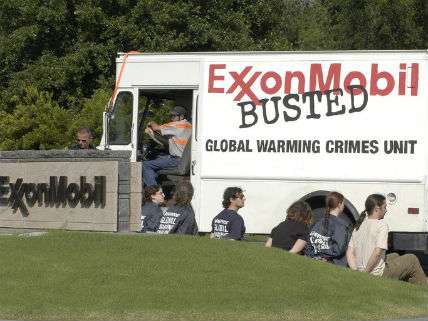Reason Foundation Included in Climate-Change Dragnet Subpoena to ExxonMobil
Attorneys-general aim to suppress disagreement on the implications of climate science and policy

In March, six Democratic state attorneys-general and the independent attorney general from the U.S. Virgin Islands joined forces with climate activist and former Democratic presidential nominee Al Gore to annnounce a legal campaign to intimidate climate change skeptics. As Gore put it, "We cannot continue to allow the fossil fuel industry or any industry to treat our atmosphere like an open sewer or mislead the public about the impact they have on the health of our people and the health of our planet."
The heart of this anti-free-speech effort has been a series of subpoenas to ExxonMobil demanding that the oil giant supply various attorneys general with all communications it has had since January 1, 1977 with groups that address scientific and policy issues with respect to climate change. On Tuesday, one of those subpoenas to ExxonMobil, a March 15 fishing expedition by former EPA lawyer and current Virgin Islands Attorney General Claude Walker, was made public, revealing the wide extent of this intimidation campaign. How wide? One of the organizations mentioned in Walker's subpoena is the Reason Foundation, which publishes this website.
Reason is far from alone. The subpoena lists nearly 100 think tanks, advocacy groups, lobbyists, and university centers with which Walker believes ExxonMobil may have had communications concerning "research, advocacy, strategy, reports, studies, reviews, or public opinions regarding Climate Change." These include the U.S. Chamber of Commerce Foundation, the George Mason University Law and Economics Center, the American Enterprise Institute, the National Taxpayers Union Foundation, the Cato Institute, the National Black Chamber of Commerce, the Federalist Society for Law and Public Policy Studies, the Heritage Foundation, and on and on.
The attorneys-general are seeking to discover some sort of an ExxonMobil-financed conspiracy aimed at undermining public confidence in the scientific consensus that man-made climate change is real and a big problem. Some who are worried about the deleterious effects of climate change have grown weary of trying to persuade their fellow citizens that the scientific evidence is on their side, and so now want to outlaw expressions of disagreement with that consensus.
For example, a prominent group of climate activists sent a letter in September 2015 to the Department of Justice suggesting that Attorney General Loretta Lynch open a "RICO (Racketeer Influenced and Corrupt Organizations Act) investigation of corporations and other organizations that have knowingly deceived the American people about the risks of climate change, as a means to forestall America's response to climate change." At a congressional hearing in March, Lynch testified that her office has considered taking legal action against groups promoting climate change skepticism.
As I have earlier argued, these subpoenas are a huge step in the direction of using the courts to silence people who hold views that differ from those of powerful government officials. It's bad enough to politicize science, but to outlaw disagreements over how to interpret science heads down the perilous path toward Lysenkoism, in which only officially approved science is allowed to be practiced and to be discussed.
ExxonMobil contributed to the Reason Foundation many years ago. If readers – including any attorneys-general - are curious about my views on climate change (and their evolution), please read my 2006 column, "Confessions of an Alleged ExxonMobil Whore," and a 2015 piece, "What Evidence Would Persuade You That Man-Made Climate Change Is Real?" In addition, my Reason Foundation colleague Julian Morris published an analysis last month assessing the efficacy of the UN's December Paris Agreement on climate change.
Disclosure: Over the years I have worked with several groups listed in the USVI subpoena on a wide variety of public policy issues relevant to resisting government encroachments into free markets, mostly not having anything to do with climate change. And I still own 50 shares of ExxonMobil stock that I bought with my own money.


Show Comments (279)